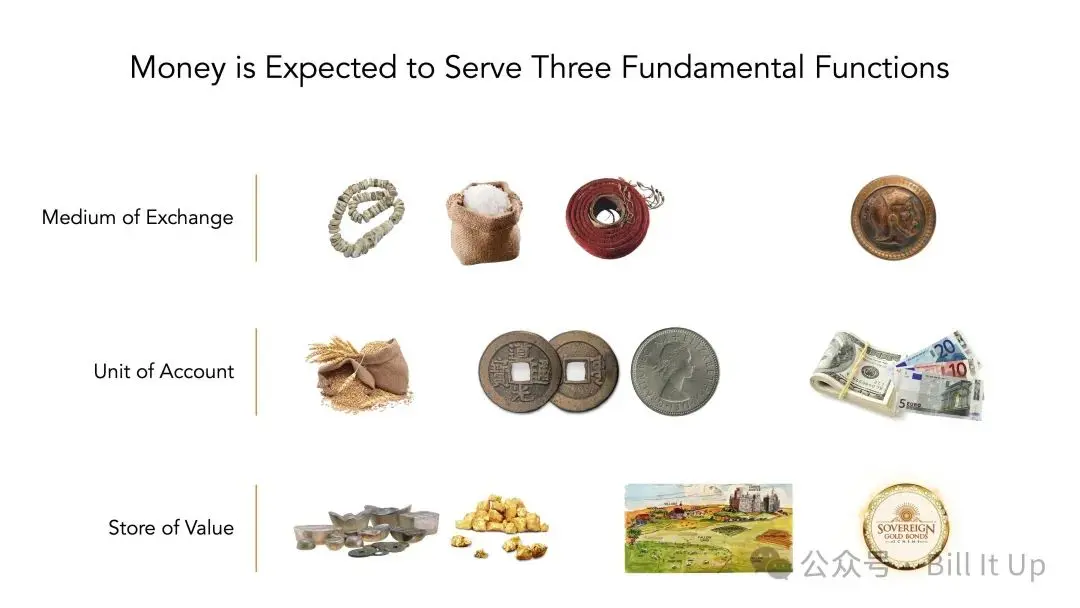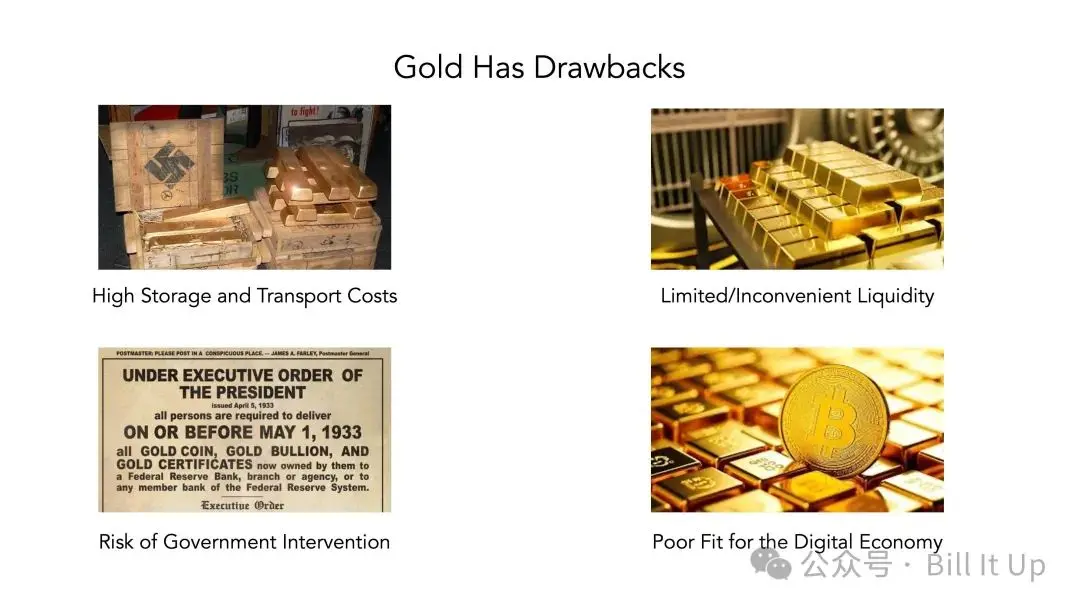Author: Bill Qian
This article is a sister piece to "How to Protect Wealth in Times of War."
We will discuss the following questions: First, what exactly is wealth storage; second, why has gold become the modern winner; and third, why Bitcoin may be a better "gold" for the 21st century and beyond.
For the past 5,000 years, there has been competition for the title of "best store of value," but gold, with its scarcity and the value consensus formed over millennia, has gradually become the king of wealth storage. At the same time, Bitcoin is slowly dissolving and shaking gold's market position, bringing epic opportunities for wealth creation and transfer to our generation in the process.
"The History of Money"
To compare gold and Bitcoin, let's first talk about the largest category in this domain: money.
Money has three core functions: medium of exchange, unit of account, and store of value. From shells and copper coins to modern fiat currencies (like the US dollar and euro), the medium of exchange and unit of account have continuously evolved. Meanwhile, gold, silver, land, and blue-chip stocks have long been mainstream choices for storage of value.
In the history of currency, the US dollar during the Bretton Woods System was one of the few currencies that could simultaneously fulfill the three functions of medium of exchange, unit of account, and store of value, but this was an exception and not common; moreover, the dollar's role as a three-in-one currency gradually unraveled after Nixon's televised speech in 1971. Some might ask: why do many people in emerging markets still wish to use and save in dollars, even when data shows the dollar is continuously depreciating? I believe the answer is: because they have no better choice; their local currencies are worse. This topic leads us to stablecoins, which we will discuss next time.

"How Did Gold Become Today's 'Gold'?"
A good store of value must meet five characteristics: scarcity, durability, portability, divisibility, and social consensus. Silver, land, and diamonds struggle to surpass gold on these five metrics.
Thus, after thousands of years, gold has finally won the consensus and mindset of humanity, becoming almost the sole target for wealth storage.
"What Are the Limitations of Gold?"
Storing gold requires expensive secure vaults and insurance, and sometimes even transportation costs, which increase with the quantity. During World War II, gold stored in the vaults of Paris banks was directly plundered by the German army. The biggest lesson from this is: the safe in the bank is not safe at all.
In extreme times, the cost of liquidating gold is very high. Similar situations occurred during World War II; whether you were in Shanghai, Paris, or Amsterdam, gold transactions often faced high discounts, typically 30-50% lower than spot prices, with even larger discounts in high-risk environments. Worse still, trading gold in conflict zones often comes with severe personal risks—once others know you hold gold bars, robbery and kidnapping can happen at any time.
Governments can further undermine the reliability of holding gold through confiscation and price controls. For example, in 1933, the US required citizens to surrender most of their gold at a fixed price below market value, or face severe penalties. Note: at that time, the US government required all citizens to surrender their gold at a fixed price of $20.67 per troy ounce. Subsequently, in 1934, the Gold Reserve Act revalued the official price of gold to $35 per troy ounce. This meant that the gold held by citizens was "devalued" by about 41% in just one year. The US confiscated over 2,600 tons of gold at that time, directly changing monetary policy and laying the groundwork for the complete end of the gold standard in 1971. All of this happened in what was possibly the most respectful country for private property rights in the world, 20th century America.
Additionally, in today's digital economy, gold's limitations in being "digital" are also quite evident. For instance, you cannot send one kilogram of gold to your friend or another address through any electronic wallet.

"In 2009, Bitcoin Emerged! What Is It?"
In 2009, Bitcoin, created by the pseudonymous Satoshi Nakamoto, became the first decentralized digital currency. It operates on a global, public, open computer network (commonly known as blockchain, a term I find quite difficult to understand)—a shared digital ledger that anyone can participate in and verify. New bitcoins are generated through "mining": computers solve complex mathematical problems, packaging transactions into new "blocks" and adding them to the blockchain, with "miners" receiving newly generated bitcoins as rewards. This process ensures the security and smooth operation of the entire system.
"What Are the Characteristics of Bitcoin?"
免责声明:本文章仅代表作者个人观点,不代表本平台的立场和观点。本文章仅供信息分享,不构成对任何人的任何投资建议。用户与作者之间的任何争议,与本平台无关。如网页中刊载的文章或图片涉及侵权,请提供相关的权利证明和身份证明发送邮件到support@aicoin.com,本平台相关工作人员将会进行核查。




